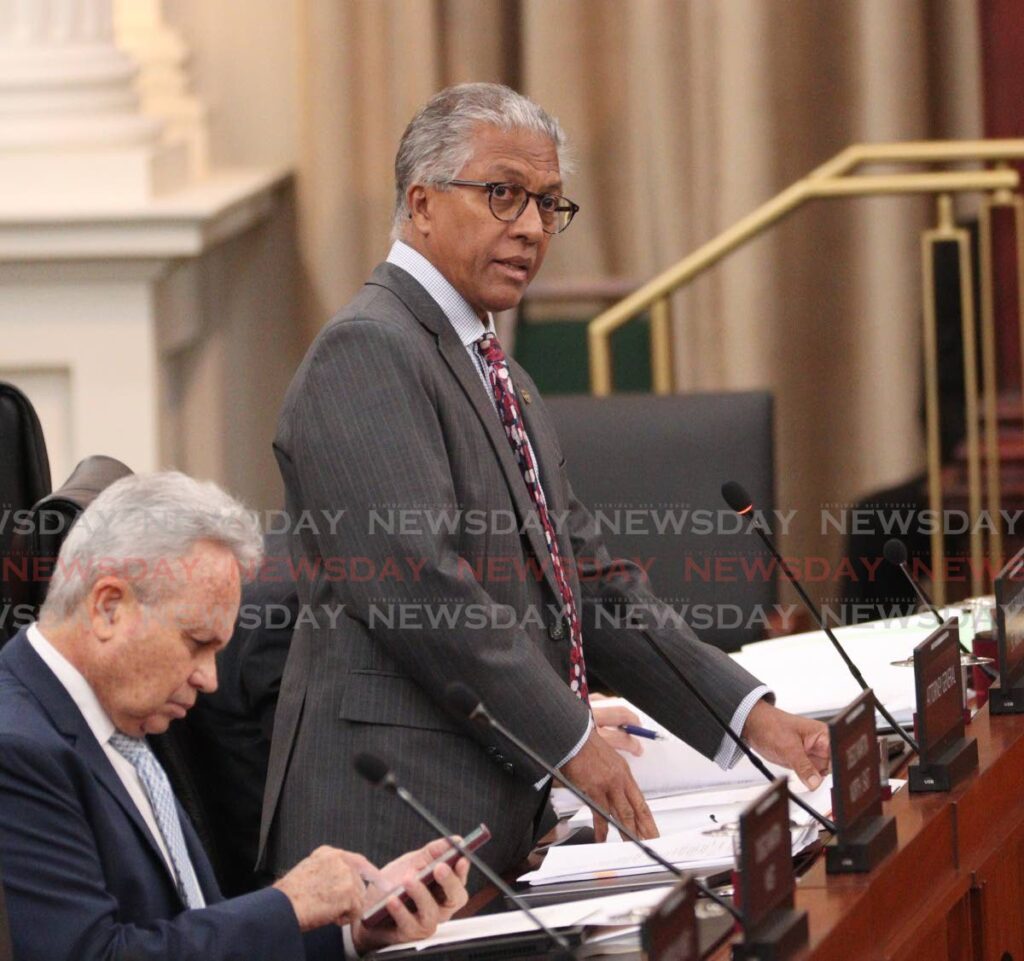 Opposition Leader Kamla Persad-Bissessar makes her contribution to the debate on the Civil Division Bill 2024 in Parliament on September 20. - Photo by Angelo Marcelle
Opposition Leader Kamla Persad-Bissessar makes her contribution to the debate on the Civil Division Bill 2024 in Parliament on September 20. - Photo by Angelo MarcelleATTORNEY General Reginald Armour says Government has heeded a call from the Judiciary for legislation to deal with critical issues affecting it, including the efficient dispensation of civil matters and hiring qualified people to handle them.
But Opposition Leader Kamla Persad-Bissessar questioned whether the Government was sincere about helping the Judiciary and if there was a conflict of interest which Armour did not disclose in the legislation that he referred to.
They made these statements in their respective contributions to debate on the Civil Division Bill 2024 in the House of Representatives on September 20.
Armour recalled Chief Justice Ivor Archie's remarks earlier in the day, at the opening of the law term at the National Academy for the Performing Arts (NAPA) in Port of Spain, about "the conversation that he is trying to have with the Salaries Review Commission (SRC) and the Chief Personnel Officer (CPO)."
Armour said the bill indicates that people with the requisite special training, experience and temperament shall be appointed to posts in the civil court.
"This is a bill that is before the Parliament today. That was approved by the Cabinet to be brought here for passage into law on the recommendation of the Judiciary, in the ongoing conversation that continues to take place between the Judiciary, represented by the Chief Justice, and the Executive, represented by the Office of the AG, myself, in an engagement with the Judiciary that does not rely on the artificiality of persons who claim to be constitutional experts when they speak to the so-called separation of powers."
Armour said Government accepts it must work with the Judiciary as an independent arm under the Constitution "to progress the quality of administration of justice for the citizens of this country."
The bill seeks to repeal the Petty Civil Courts Act and create a new civil division within the Judiciary to deal with civil matters.
This division will comprise a civil court, small claims court and estates administration office.
One of the functions of the civil court will be hearing election petitions.
This court may conduct its hearings in person or by telephone, video link or other appropriate electronic means.
 Attorney General Reginald Armour addresses the Parliament, alongside Finance Minister Colm Imbert, on September 13. - File photo by Angelo Marcelle
Attorney General Reginald Armour addresses the Parliament, alongside Finance Minister Colm Imbert, on September 13. - File photo by Angelo Marcelle
As he outlined different aspects of the legislation, Armour said Archie had touched on some of them as well in his address
"It is a remarkable coincidence, in the context of the opening today of the new law term, and the remarks of the honourable Chief Justice, that this bill is being debated for passage in this House today."
Armour said the bill was first listed on the House's order paper on June 28.
He recalled meeting the bill on his desk when he was appointed AG in March 2022.
The proposed civil division, Armour continued, will be structured similarly to other specialised courts such as the family and traffic courts.
"The civil division will focus on streamlining civil cases within a specialised court structure that can expedite the resolution of small claims as it affects the common men and women in the streets of TT in our communities and other parts, and manage estate administration (probate matters) much more efficiently and expeditiously."
Armour added that the small claims court will resolve matters involving sums below $50,000.
He said existing civil-court arrangements are hampered by deficiencies such as case disposal times of two years or more and numerous administrative bottlenecks.
He said the handling of probate matters has been equally inefficient for a long time.
"The probate registry is significantly delayed, completing only about 35 per cent of all large estate cases, causing understandable, extensive public frustration. It is those ills that this bill seeks to rectify effectively and expeditiously in order to make the delivery of the justice system, as it affects all of our citizenry, that much more effective."
Armour told MPs 138 countries have recognised the importance of small claims courts to free up the larger courts to handle more complex matters.
He added that matters of libel and slander will not be handled by the small claims court but remain in the civil division of the High Court.
In her contribution, Persad-Bissessar said the Opposition supported the bill in principle.
But she questioned whether Government's support for the Judiciary was genuine.
Persad-Bissessar said notice that the House would debate the bill was given on September 11, and notice of the law term's opening on September 17. She added there was no coincidence in the bill's being debated on the same day.
Persad-Bissessar claimed the PNM was never committed to working with the Judiciary.
"Every year, the Chief Justice has been crying out on this issue, for financial autonomy (for the Judiciary)."
Apart from mentioning financial autonomy for the Judiciary in its first budget in 2015, Persad-Bissessar continued, the Government had never raised the issue again.
After noting the bill talks about mediation as form of dispute resolution, she asked whether Armour had a conflict of interest in this matter.
She said documents from the Integrity Commission showed Armour had declared an interest in a company called Dialogue Solutions in 2021, 2022 and 2023, and asked whether he or a close relative had interests in that company.
Speaker Bridgid Annisette-George agreed with a complaint raised by Leader of Government Business Camille Robinson-Regis that this issue was not connected to the debate.
Persad-Bissessar called on Armour to clarify the matter at the end of the debate.
She questioned whether the bill could create corruption in hiring practices, if people were going to be appointed to contract positions in the proposed civil court division.
Persad-Bissessar said contract positions approved by Cabinet usually last for three years, but some of the posts mentioned in the bill referred to five-year contracts.

 1 month ago
29
1 month ago
29
 English (US) ·
English (US) ·